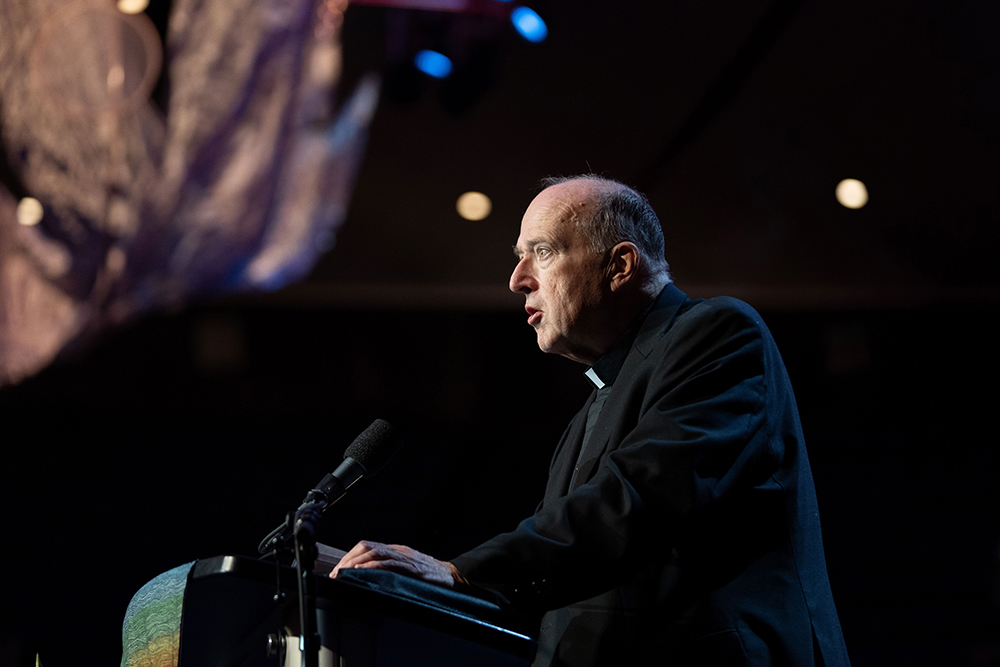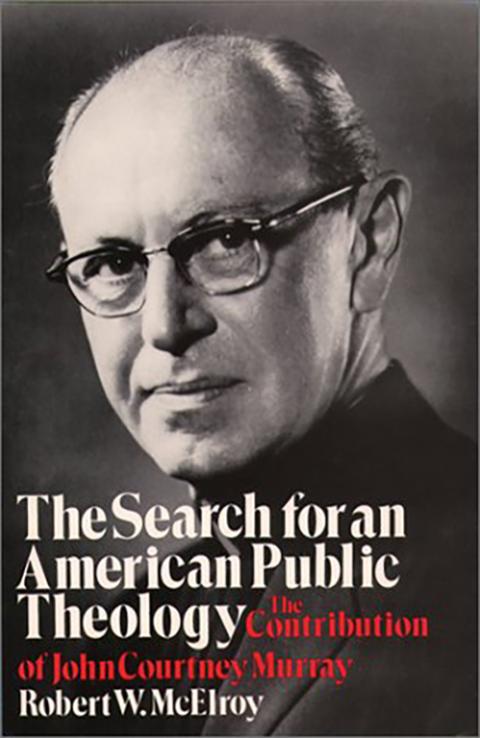
Cardinal Robert McElroy of San Diego gives a talk Feb. 16, 2024, at the Los Angeles Religious Education Congress in Anaheim. (OSV News/Courtesy Archdiocese of LA Digital Team)
Cardinal Robert McElroy's scholarly work is one of the things that most distinguishes him. Appointed the eighth Archbishop of Washington, announced Monday, McElroy in 1989 authored a book, The Search for an American Public Theology: The Contribution of John Courtney Murray that demonstrates why his intellect is so universally admired, even by those who may disagree with him.
McElroy's admiration for the Jesuit theologian is obvious on every page. His affinity for Murray does not keep him from offering criticisms of Murray's work, even if they are few. And the two have similar talents: a gift for powerful prose wedded to a deeply analytical and penetrating mind.
Murray was a giant, and he was writing in the mid-century 20th century when the fate of civilization hung in the balance, not only intellectually but in practice: Almost all the great capitals of Europe, from Kyiv to Paris and from Athens to Amsterdam fell under Nazi tyranny, while the ancient civilizations of China, Java and the Malay peoples were crushed under the yoke of Japanese military imperialism. America was awash in material prosperity yet increasingly culturally adrift. Murray was, as McElroy observes, "not sanguine" about the times in which he did his finest work.
"While previous centuries had produced movements which temporarily lured men and women away from the moral and religious beliefs that were fundamental for human flourishing, only in the twentieth century did it seem possible that whole societies in the West would forsake their spiritual and ethical heritage in order to build a culture which was secular in origin and scientific in orientation," McElroy writes.
Advertisement
McElroy notes that the phrase "secularist crisis" is found "constantly in Murray's works." It built on the "acceptance of the theory that commitments of faith and prayer were private and personal choices which should not be allowed to enter the social arena." This "onrushing tide of indifferentism" would yield only "a shallow humanism that could lead to ennui and despair." The darkness of the assessment is bracing.
The spiritual crisis was in the temporal order, not in the church. Murray was devoted to the theory of the two swords devised by Pope Gelasius which he called "the Magna Carta" of the church's freedom. The fifth century pontiff had written to the Emperor Anastasius, "Two there are, noble emperor, whereby this world is ruled in sovereign fashion. The consecrated authority of the priesthood and the power of the king, and of these two the responsibility of the priest is by so much the weightier." The teaching admitted that secular authority came from God, and was not derivative of clerical authority, but that the secular realm could not interfere with the res sacrae or sacred things.
McElroy examines Murray's tracing of the historical developments that led from the medieval Christian commonwealths to the secularist crisis of his own time. Unlike University of Notre Dame historian Brad Gregory who argued that the starting point for secularization could be found in the Protestant Reformation, Murray thought the rise of absolutist monarchies is what destroyed the two swords' balance and threatened the liberty of the church.
The French Revolution introduced a secularist theory of society. The "supposed neutrality of the nineteenth century liberal state masked a secularist agenda which sought to displace the traditional role of Christianity in Western society." All these paved the way for totalitarianism in his own time. McElroy's ability to summarize Murray, here and throughout the work, leads one to conclude his mind is not only sharp, but able to synthesize, a key intellectual quality in a pastoral leader.
McElroy details the influence of two European thinkers on Murray's work, Henri de Lubac and Jacques Maritain. While it is easy to pass over the few pages that note that influence, they touch on one of the key issues in the book: Murray's embrace of dualism. McElroy, in the last chapter of the book, evaluates Murray's reliance on natural law, rather than biblical theology, as the basis of his public theology and poses the question: "does his refusal to utilize the powerful symbols of biblical theology now invalidate his body of writing as a foundation for a contemporary American public theology?" McElroy gives a robust explanation for, and defense of, Murray's decision to keep any sectarian arguments and symbols away from his public theology.

The cover of "The Search for an American Public Theology" by Cardinal Robert McElroy
This dualism of the temporal and sacred orders in society, however, gives rise to a deeper debate about dualism between grace and nature, a debate that has dominated much of post-conciliar thinking. The late David Schindler in this paper delivered at a Notre Dame forum argued that de Lubac's theology was different from the dualism Murray espoused in important and foundational ways.
Later, in his book Heart of the World Center of the Church: Communio Ecclesiology, Liberalism and Liberation (reviewed favorably by me here and unfavorably by my friend Fr. Joseph Komonchak here) Schindler raised similar criticism of Murray by employing the theology of Hans Urs von Balthasar, a colleague of de Lubac's.
It should be noted that the influence of de Lubac on Murray that McElroy cites was before the Second Vatican Council, when both theologians were tangling with, and losing to, the integralist Roman theological authorities. It was after the council and Murray's untimely death in 1967 that de Lubac, von Balthasar and Joseph Ratzinger founded the journal "Communio" and the debate on dualism took off.
The new archbishop may not have much time to write on this issue anytime soon, but it cuts through some of the most important issues surrounding the interpretation of the documents of Vatican II.
Successive chapters deal with the issue of secularism in the cultural realm, the political order, and in international politics. All three chapters delve into the nuances of Murray's thought, while pointing out the times when his arguments appear dated.
The analysis of American culture is especially penetrating. Murray argued that the traditions of civic republicanism, with its emphasis on "integrity, public service, civic unity and social dialogue," and Calvinist morality, which "produced a strong sense of social virtue and self-sacrifice," had become atrophied. They no longer served as the kind of cultural bonds able to withstand the technological secularism and philosophical pluralism which created strong centrifugal cultural forces.
The renowned theologian Jesuit Fr. John Courtney Murray is pictured in an undated photo. (CNS files)
He drew heavily on the writings of two of the nation's outstanding public intellectuals, Walter Lippmann, one of the founding editors of The New Republic, and Adolph Berle, a professor of law at Columbia University and member of Franklin Roosevelt's "brain trust." Murray thought that the forging of a public consensus had no better friend than the Catholic intellectual tradition, and he confidently entered the elite debate while at the same time noting that "the masses in the United States had been more faithful to the tradition of reason than the 'wise and honest' had been."
The chapter on renewing the political order is brimming with keen insights. My favorite was this:
But anxious as Murray was to see religious values involved in the formation of public policy, he was just as anxious to insure that theology not rigidly control political policy. For too intimate a bond between religious beliefs and the actions of the state would lead to "the peril of the corruption of both — the corruption of religion and the corruption of the state."
Religious values were essential to establish the order of justice on firm ground, but governmental policies must shift with changing times and circumstances in ways that religious values do not.
The chapter on the international order contains the most frequent instances of datedness. Murray was writing during the twin nightmares of fascist totalitarianism and Cold War militarism. His patriotism was pronounced and vivid. "Murray's writings during the 1940s betray a pervasive sense of confidence that the post-war era would be markedly different from the previous century," McElroy writes, "and that a mass-based regeneration of the moral bases of international politics was not only possible, but likely." He was not alone in this hope and would not be alone in its disappointment.
If the first four chapters of this book consist mainly of McElroy elucidating Murray's thought, the final chapter is his defense of that thought. His positive, but not uncritical, assessment of Murray is shaped by three questions. Methodologically, does natural law language furnish Americans with the best, perhaps only, means for discussing the role of religion in public life? Topically, are the issues Murray addressed and the framing he used still the most important issues facing Americans? And, prescriptively, does Murray's application of natural law to America's ills still work, or have the problems changed so much that they must be abandoned?
Religious values were essential to establish the order of justice on firm ground, but governmental policies must shift with changing times and circumstances in ways that religious values do not.
In answering these questions, as noted, McElroy takes on the issue of dualism and Murray's critics. He also thinks Murray would reject the religious right's effort to inject religion into the public square: Because of the pluralism of our society, "any effort to recreate the moral order of the United States on the bases of specifically sectarian warrants will only succeed in furthering the divisions in American society."
One passage especially stands out. McElroy writes: "In exposing the premises and the ramifications of philosophical pluralism, Murray's public theology can help to bring people of the United States to see that it is possible to embrace a meaningful ethical code for social life which is not in any way intolerant or parochial, and that the alternative to embracing such a code is not tolerance and pluralism, but chaos and the domination of self-interest." McElroy's application of Murray's thought to the issues of abortion, pornography and other social issues is brilliant but you'll need to buy the book and read it lest that application be turned into a bumper sticker.
In fact, this is my primary take away from reading McElroy's book on Murray's social ethics. We live in a time when the nature of political campaigns and the easy hostility of social media reduce so much of our political discourse to bumper sticker sloganeering, reading a book like McElroy's is something like an intellectual retreat. He invites the reader to engage Murray's thought not as an arcane remnant of a distant past, but as evidence of one great mind wrestling rigorously with the cultural and political problems of his day in ways that are still relevant to our wrestlings today. There are no cheap shots. There is no ducking of tough questions. There are no intellectual shortcuts. McElroy's book is not an easy read; it is challenging.
When you put it down, you realize just how brilliant is the mind of the man the pope just sent to be the archbishop of Washington.







